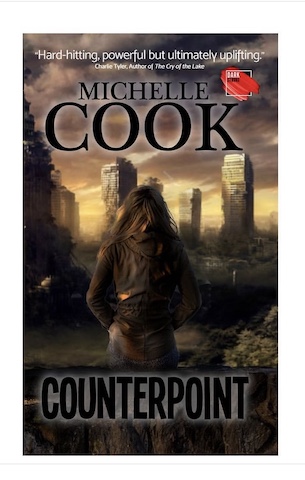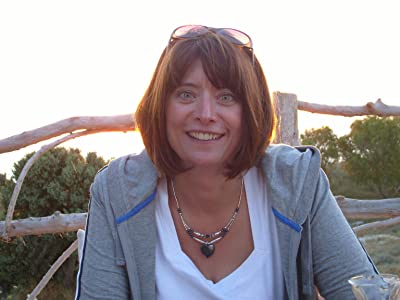Michelle Cook is the next darkstroke books author to feature in the 6Ws series. (With a nod to my former life as a journalist, I opted for the 6Ws of the business: who, what, when, where, why and how, which counts as it ends in W.) Michelle’s most recent release is Counterpoint, which is a sequel to Tipping Point, her debut novel. Both stand on their own, however. These eco-thriller adventures follow the story of a young woman called Essie. But I will let Michelle tell you about her writing and her books herself.
Who is Michelle Cook?
That’s a tricky question to start with!
I’m an author who lives in the UK with my husband and two children aged nine and six. By day, I work for the National Health Service, but I disappear into fiction whenever I’m left to my own devices.
I write all sorts of tales, but they mostly turn out dark, sometimes despite my best efforts. They are usually “what if?” stories – taking something from life around me and moving it on a step or two to see what happens. I’m also interested in resilience, and how people deal with extreme situations with a wider context. I naturally lean towards thrillers and dystopia.

What is your latest book?
My recent release is called Counterpoint. It’s a follow up to my debut novel Tipping Point, but it’s a standalone story if you haven’t read the first. The books are eco-thriller adventures that follow the story of a young woman called Essie. She lost all her family in a terrorist bombing some years before the story opens and lives a meagre existence in the 2040s amongst climate breakdown and social unrest. An authoritarian government controls the population with draconian laws and propaganda and the corrupt Prime Minister, Alex Langford, lines his own pockets while society collapses around him.
Essie discovers an elite conspiracy to suppress technology that could reverse climate change and provide limitless free energy. This puts her in the middle of a dangerous power play and in mortal danger. She must decide if she’s willing to risk everything to expose the plot.
When did you begin writing?
I loved reading and writing stories as a kid. My first real memory of creative writing success was at the age of ten, when the teacher read out my short story in class. A slapstick tale of two talking kangaroos breaking out of a zoo, the work was sadly lost to history. But something in me must have remembered the buzz of others hearing my words.
Over the years, I got distracted by life and jobs, and stopped writing though I never stopped loving stories and was an avid reader.
A few years ago I took it up again, thinking it would be an excellent release from everyday life. Stress-free it was not but having two books published now is one of the things I feel most proud of and I can’t imagine stopping now. I’m a little while from retirement but I have a vivid plan of how I will spend my days when I get there!
How do you write?
Sporadically! I have one day set aside a week where I’m not working, and the kids are at school. That’s my writing day, though when I’m in the swing I will also write at night when everyone else has gone to bed. I often plot and think about the story while driving or listening to music—I love to build a playlist for each book. But when I get down to writing it, I need silence so I can forget the real world around me.
When it comes to novels, I’m a plotter. I always work to an outline which lays out chapter by chapter how the story will unfold. It helps me see the bigger picture and get though the inevitable ups and downs of writing a book. Any author will know it’s a marathon effort and I need the scaffolding of a plan to keep me motivated. When I was drafting Tipping Point and got blocked, I jumped ahead to write scenes I could picture clearly and that sparked my enthusiasm again. I couldn’t have done that without an outline.
Where do you write?
At home, usually on my floppy sofa. Terrible for the posture, I’m afraid. I’ve tried to do the writer thing and set up in café, but I’m too nosy and distractable. I end up people watching instead of working. I have to be quite strict with myself to get anything done.
Why do you write?
It depends on what I’m writing. Sometimes I’m trying to pour out my brain because I would drive my family crazy if I didn’t write it down. I get passionate when I see unfairness and injustice, to a point where I can’t understand why the world keeps turning while this stuff is going on. Writing helps get it off my chest without getting a divorce. Tipping Point was born of this obsession, during the era of Trump and Brexit, because I was so frustrated at the world’s blindness and I wanted to make it listen. Whether it does or not, the story is out there now.
On the lighter side, I suppose it goes back to the kudos of being the one who amused the class with my kangaroo story. I’m not the person who’ll regale you at parties, though. I don’t like the spotlight like that. Things always come out better for me in writing than talking. I love the idea that I can sit in my little corner and make stuff up, and you could sit in your corner and read it and think, “That was a great story, I enjoyed that.” I’m shy, though, so it’s best if I’m in the next room with a glass of wine when you read it!
The best times are when I’m writing to entertain myself. Someone once said write the book you want to read, and that’s always the aim. If I’m enjoying it, I can dare to hope my readers will too.
Thank you so much for hosting me, Joan. I had tons of fun responding to your journalistic probing!
More about Michelle Cook:
You can buy Tipping Point and Counterpoint here: http://mybook.to/counterpoint
Catch up with me on social media here: Linktree

